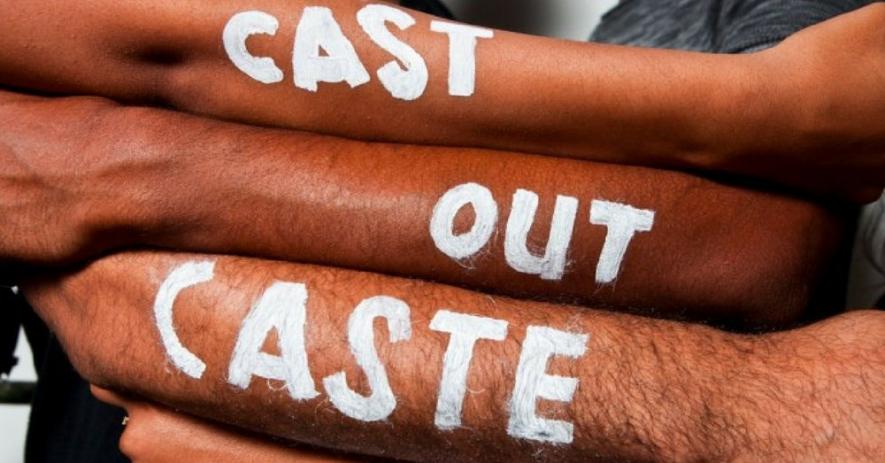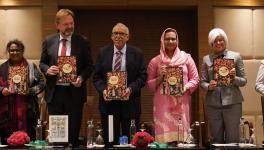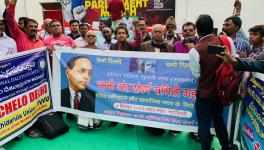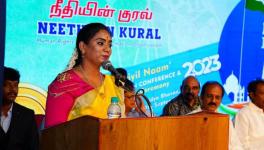Murmu Case Symptomatic of Growing Caste Malaise in India

On 2 September, Dr Maroona Murmu, an assistant professor of history at Kolkata’s renowned Jadavpur University, posted a comment on her friend’s Facebook page. Expressing her personal opinion on the government’s decision not to postpone final examinations in spite of the ongoing Coronavirus pandemic, she wrote, “One year cannot be more precious than someone’s entire life.” What ensued was a barrage of criticism, led by a third-year student of Bethune College, a reputed women’s college, and followed by hundreds of other social media users, which according to the latest estimate, numbered no less than 1,900.
Astoundingly, however, the hate messages did not focus on the issue at hand. The abusers had launched a casteist attack on Murmu, who belongs to the Santhal social group, categorised as a Scheduled Tribe. The messages questioned her educational qualifications, cast aspersions on her eligibility to teach at a prestigious university and dismissed her views as a reflection of the “demerits” of caste-based reservations in education and other spheres. “Incompetent and undeserving people get ahead by taking undue advantage of the system of caste reservation in education,” read one of the messages, “while the deserving people get left behind.”
Kolkata, which has traditionally prided itself on being liberal, progressive and secular—attributed to several factors including, historically, it being the locus of the Bengal Renaissance and more recently it being the seat of power of the three and a half decades of uninterrupted Communist rule—reacted with outrage. Counter attacks poured in on social media and various academic and rights groups issued statements of scathing criticism. The Jadavpur University Teachers’ Association (JUTA), the All Bengal University Teachers’ Association (ABUTA) and faculty members of Murmu’s alma mater, Presidency University, among others, condemned the “vicious trolling and hate attacks”. The Bethune College Students’ Committee too distanced itself from the comments and said that they were “aggrieved” by the “anti-Dalit” sentiments expressed.
In spite of all the support and solidarity that has been extended to Murmu, however, the incident has exposed an ugly reality and that is that caste discrimination is alive and kicking even amidst the so-called “educated” youth of a city like Kolkata, perceived to be a paragon of progressiveness. Dalits and Adivasis of West Bengal beg to differ that West Bengal is any different when it comes to discrimination and social bias against members of their communities. While expressing her heartfelt gratitude to all who have condemned the slur and stood by her, Murmu said, in an interview to this correspondent, that she is surprised by the reactions of shock because there is “nothing new about Dalits and Adivasis being subjected to humiliation. It is routine”.
Indeed, once again the episode has triggered the recurrent debate about how “casteless” Kolkata and West Bengal really are. “The perception that West Bengal is less caste conscious than many other Indian states is rooted in the fact that, historically, it was the seat of the country’s first progressive, liberal and secular organisations and movements which rejected regressive thinking,” says Chandra Kumar Bose, politician and grandnephew of Netaji Subhash Chandra Bose. “Netaji and Bengal’s other leaders advocated social unity and inclusivity, which influenced popular thinking, and their ideas are expected to have percolated down the generations and created mindsets of equality. It is therefore disheartening to witness the kind of intolerance that is in view,” he says.
Left politicians point out that the emphasis on class rather than caste during the Left rule in Bengal played a key role in re-establishing the state as liberal and secular in more recent times. “The commitment of the Left Front government in standing by the working classes regardless of caste or creed, both in the rural and urban areas, precluded the exploitation of caste divisions,” explains Mohammad Salim, senior Communist Party of India (Marxist) leader and Politburo member. Indeed the socio-economic class that constituted the Left electorate composed and contained within it the Dalits, Adivasis, Scheduled Castes, Schedule Tribes and Other Backward Classes, as well as underprivileged minorities.
Yet, Bengal’s Dalits and Adivasis, as Murmu avers, would report that the perception does not reflect the ground realities. She says, “Caste discrimination is rampant and an integral part of the daily lives of the communities [of SCs/STs and OBCs] which are living it.” She says the prejudice is driven home early and stays with a person for life.
Recalling an incident when she was in the second standard (in a Christian school in Calcutta where the medium of instruction was English), she says, “One day, one of my teachers asked me, in front of the entire class, whether I was a ‘Scheduled Tribe’. I was caught completely off-guard. I had no idea. My family was progressive and these issues were never discussed. When I told her I did not know, she said, surprised, ‘You don’t know your own caste?’ She asked me to find out from my older brother, who was in the same school. I ran to his classroom and called him out urgently. His class was on, but sensing the immediacy he asked to be excused and stepped out. He informed me that we belong to a Scheduled Tribe.”
The episode has scarred Murmu for life. Academically meritorious, she completed her degrees from India’s premiere institutes including Presidency University, Kolkata, and Jawaharlal Nehru University, Delhi, before starting work as assistant professor at Jadavpur University. “But in the case of Dalits and Adivasis, achievements are rarely attributed to merit and more to the system of ‘quota’,” she rues.
One of the most common forms of discrimination she encounters is the presumption that SCs, STs and OBCs, because they often get admitted to educational institutions or find employment in government sectors through reservations, are somehow less qualified than those who do fall in the general quota. “I always check the surname of a doctor before seeking an appointment and avoid those from SC, ST or OBC backgrounds,” admits a city-based schoolteacher I approached for a straw poll. “To me, those who get entrance into medical institutions through reservations will always be suspect.” Observing that such insults, though common, “still sting”, a gynaecologist in Kolkata says, “I studied just as hard, if not harder than my colleagues to prove a point, and passed the medical examinations with high marks.”
A key indicator of the prevalence of caste discrimination is in the area of matrimony. Marriages, especially arranged ones, still have a checklist of the brides’ and grooms’ compatibility quotient, and topmost is whether their castes match. Even “love” marriages are not spared. “Marrying into a so-called lower caste is considered taboo even today and can cause considerable consternation in the family,” says Ipsita Mitra, who, being from an elite caste Kshatriya family, found it difficult to convince her parents that she wanted to marry a man from another caste. “My parents didn’t speak to me for months, but they gradually accepted the marriage, realising I was marrying a good person.”
A host of other discriminatory behaviour in Bengali society points to the existence of caste barriers. “It is still a practice in most upper caste households not to drink water handed to them by a Dalit or Adivasi, far less eat together,” says sociologist Usha Das.
A section of political commentators point out that politics in Bengal is also not free from the influence of caste. “While compared to states like Uttar Pradesh and Bihar, the predominance of caste politics may be somewhat less, mostly because the emphasis on class takes care to cater to the same constituency,” observes Prof. Biswanath Chakraborty, political scientist and psephologist, “but to say that Bengal has [completely] steered clear of caste politics is incorrect.”
An example is the Matua sect, which, once considered an untouchable caste, was organised into a large community of Sudras by their leader, the spiritualist Harichand Thakur, and has since been considered a powerful influence in swinging the Dalit vote.
It important to note that Assembly polls are due in West Bengal in summer 2021 and the growing competition over the state’s voters is fuelling outrageous political narratives. The unhindered expression of casteism is linked to a general trend of regressive behaviour in the public arena. A case in point is the Sushant Singh Rajput and Rhea Chakraborty case, which is both blatantly political and casteist. With elections forthcoming in Bihar as well, the deceased actor and his girlfriend have been turned into a high profile “Bengali-Bihari couple”, in which, as if to complete the cycle of regressive behaviour, an element of misogyny too has been injected, by painting the woman as villain. West Bengal politics, reflecting this retrogressive casteist churning, is participating too, as evident from the comments of a prominent Congress leader recently, in which he referred to Rhea as “Bengali Brahmin lady”, pitting her against the Bihari Rajput identity.
The environment in the country is tense in any case due to the virtually endless lockdown imposed to control Covid-19. There is a huge sense of frustration among students in West Bengal, as they confront an uncertain future. Prof Murmu’s completely innocuous comment on the need to postpone the schedule of examinations certainly led to an overreaction, but it is also in sync with the regressive and abusive culture prevailing on social media these days.
After the recent incidents, educationists are really starting to worry about the direction West Bengal is headed in. “It is a cause for concern that the casteist attack on Murmu came from a member of the educated class, which is expected to understand the implications of caste-based reservations as a step towards gradually ironing out social and economic inequalities,” says Professor Om Prakash Mishra, head of the department of International Relations at Jadavpur University.
The irony is that this slur comes at a time when the Mandal Commission recommendations, which advocated the inclusion of more Scheduled Castes, Scheduled Tribes and Socially and Educationally Backward Classes into the spheres of higher education and employment, has just completed three decades.
Says Mishra, “It is unfortunate that there is an attempt to denigrate those who have been able to break the barriers and achieve success. Our colleague, Maroona Murmu, is a qualified professor and an extremely capable teacher. To try to tarnish her achievements by attacking her caste is condemnable.”
But that is because caste discrimination lurks stealthily, just underneath the surface, and unless it is eradicated completely it will continue to rear its ugly head every so often. At the time of going to press, it is reported that Murmu has filed a police complaint against the perpetrators of the vicious attack.
The author is a freelance journalist. The views are personal.
Get the latest reports & analysis with people's perspective on Protests, movements & deep analytical videos, discussions of the current affairs in your Telegram app. Subscribe to NewsClick's Telegram channel & get Real-Time updates on stories, as they get published on our website.
























